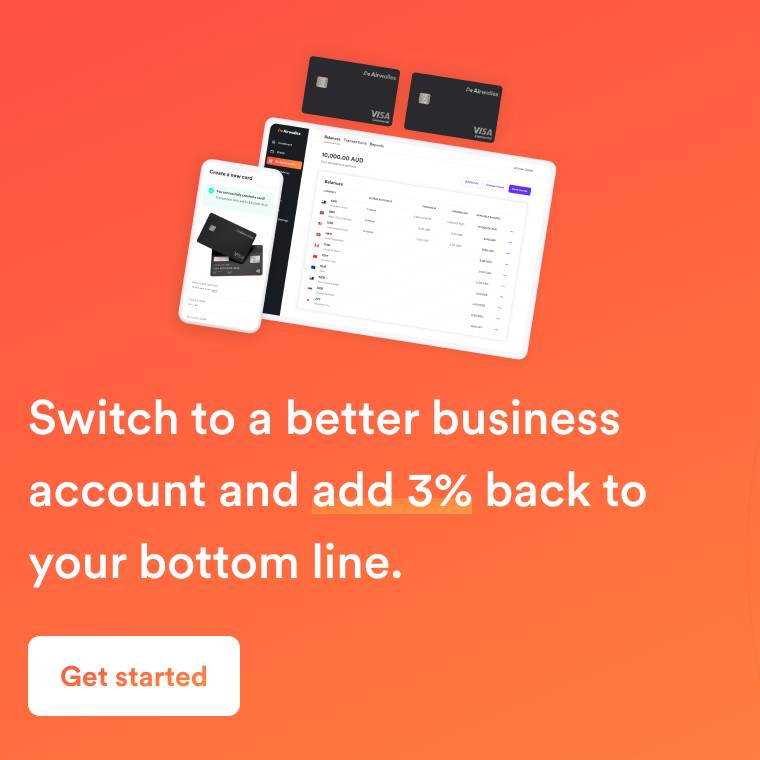What is foreign exchange risk?
Also referred to as currency risk and FX risk, foreign exchange risk describes the risk that a company will be financially impacted by fluctuations in currency exchange rates. For example, if a UK business exports goods to the US and collects payment in US dollars, the appreciation or depreciation of the US dollar against the pound will affect their profit margins.
Businesses that switch to an Airwallex multi-currency business account can collect multi-currency payments and hold them in their account until the currency exchange rate is favourable. This is known as “hedging” against foreign exchange risk.
The three types of foreign exchange risk
1. Transaction risk
This is the risk that businesses face when making financial transactions which require a currency exchange. When exchange rates change, businesses will experience financial upside or downside when converting their home currency to or from a foreign currency.
2. Translation risk
This affects multinational companies. Companies with subsidiaries in foreign countries must convert the value of their assets and revenue into their home currency when filing quarterly financial statements. Changes in FX rates will affect the value of those assets, and therefore impact the company’s financial reports.
3. Economic risk
This refers to the risk that a company will be impacted by changes in macroeconomic conditions including FX fluctuations, wars, political unrest and environmental disasters. Economic risk can be difficult to predict, which is why investors rely on credit rating agencies.
Which companies are affected by foreign exchange risk?
All companies that trade across borders are exposed to foreign exchange risk. That includes companies that buy products and materials from international suppliers, collect payments from international customers, or own multi-national business entities.
Some examples of companies affected by foreign exchange risk are:
Import/export companies
If a company purchases goods from an international supplier, the price they pay when converting their home currency to the supplier's local currency will vary depending on the shifting exchange rate. It’s cheaper for the business to pay suppliers when their home-currency is strong against the supplier’s currency, as this means the transaction will be cheaper for them.
Investors
When investors buy international stocks, fluctuating exchange rates affect the value of their investments. For example, if a UK investor has a large US portfolio and the value of the dollar drops, the dividends from their US stocks will be worth less when converted to GBP.
Investors also experience risk when buying and selling international stocks. Say a UK investor decides to buy stocks from a Spanish company when the GBP/EUR exchange rate is 0.8460. The stocks are priced at €50 each, so the investor expects to pay £42.30 per stock. But the trade is delayed, and in that time the exchange rate changes to 0.9000. Now the investor has to pay £45 per stock, the stock value has stayed the same but he’s lost money.
Ecommerce businesses
Ecommerce businesses are subject to foreign exchange risk when selling products abroad. If the value of a currency drops in a certain country, the seller will be left with less profit when converting those customer payments to their home-currency.
Multinational corporations
Businesses with offices or subsidiaries abroad will be exposed to both translation and economic risk. Currency fluctuations may affect the value of their international assets, impacting their financial reports. Macroeconomic conditions may have a positive or negative effect on their foreign entities, altering the financial position of the company as a whole.
The upside of foreign exchange risk
Foreign exchange risk is not always negative. Fluctuations in FX rates can have a positive effect on a business or investment.
If a business is expecting a payment in a foreign currency and that currency appreciates in value against their home currency, the business will enjoy greater profits when converting the payment back to their home currency.
Business owners and investors can hedge against exchange rate fluctuations to avoid the downside of foreign exchange risk and enjoy the upside.

How to hedge against foreign exchange risk
There are several ways to hedge against foreign exchange risk, the right solution depends on the needs of your business. Here are some examples:
1. Multi-currency business accounts
Multi-currency business accounts (like Airwallex) allow companies to collect and hold several currencies in their account at one time, then exchange the currencies when the FX rate is favourable. This enables them to hedge against transaction risk.
For example, a UK ecommerce business can accept payment in US dollars, Euros, Chinese Yuan etc, hold those funds in their account, then convert the funds to GBP when the exchange rate allows for the greatest profit.
2. Currency forward
A currency forward is a binding contract that locks in an FX rate before the purchase or sale of one currency for another.
For example, if a business is expecting a large payment in a foreign currency, and is concerned that the currency might depreciate in value before they receive the funds, they can apply to their bank for a currency forward and lock in the exchange rate for the transaction.
When the business receives the payment, the bank will convert the money to their home currency at the agreed exchange rate, even if the value of the currency has changed over time. A currency forward can give businesses peace of mind when trading in foreign currencies, but it can lead to downside as well as upside.
3. Currency futures contracts
Currency futures contracts allow businesses to transfer the potential risks and rewards of currency fluctuations onto an investor.
Like forward contracts, currency futures are legally binding contracts which specify a price at which a currency may be bought with another currency at a future date. The difference between forward contracts and futures contracts is that futures contracts are standardised, regulated and traded on stock exchanges, reducing their risk.
4. Currency ETFs
Currency ETFs (exchange traded funds) are used by some investors to hedge against foreign exchange risk.
ETFs provide an easy and cheap way to trade currencies. Investors can use ETFs to diversify their stock and bond portfolios and manage the risk from international investments.
Hedge against foreign exchange risk with Airwallex
Airwallex is the multi-currency business account and payment platform that can help your business push into new markets whilst hedging against foreign exchange risk.
With an Airwallex foreign currency account, you can hold 11+ currencies, for growing international businesses, which include:
Collect payment from your international customers directly into your account and exchange them when the FX rate is most favourable.
You can also transfer money internationally from your account around the world with no transaction fees at our bank-beating FX rates.

Related articles about business banking:

Tilly Michell
Content Marketing Manager
Tilly manages the content strategy for Airwallex. She specialises in content that supports businesses in their growth trajectory.
Posted in:
Transfers
